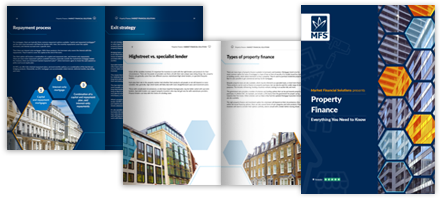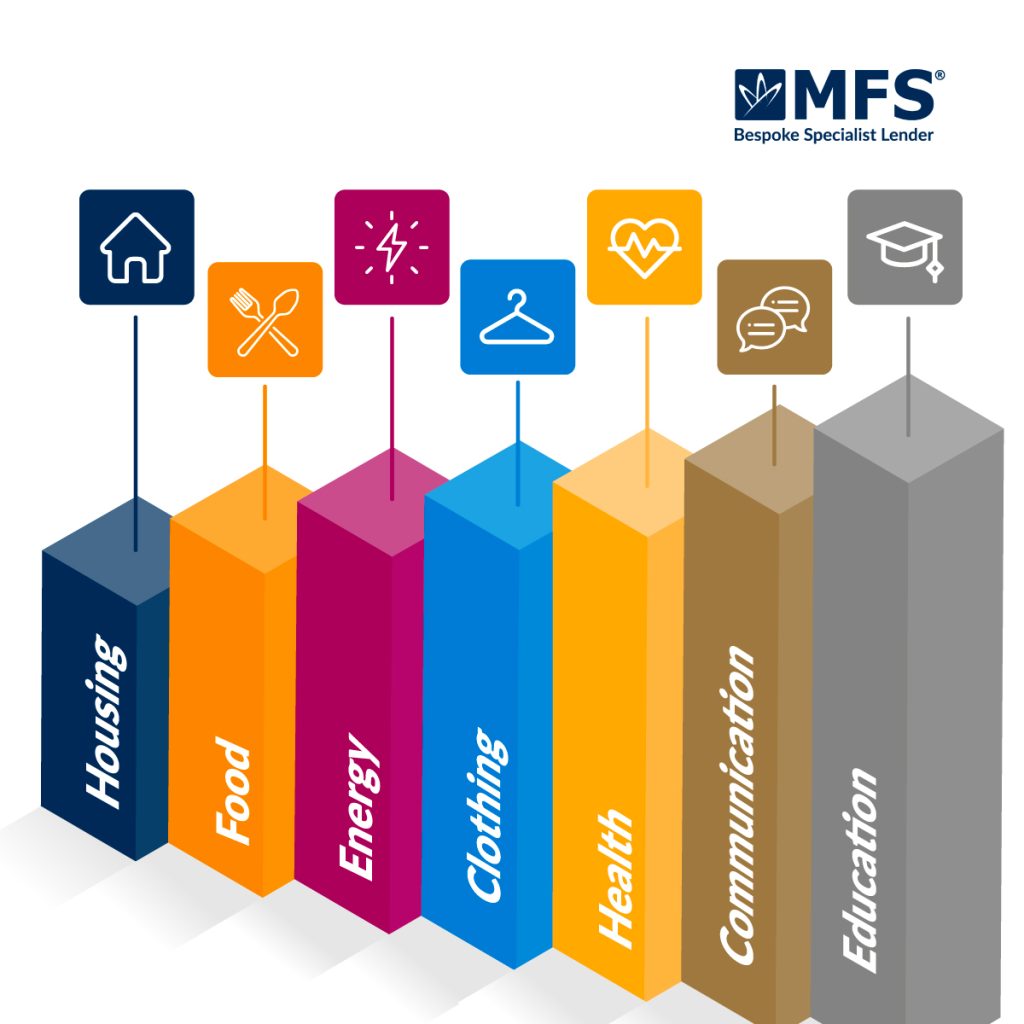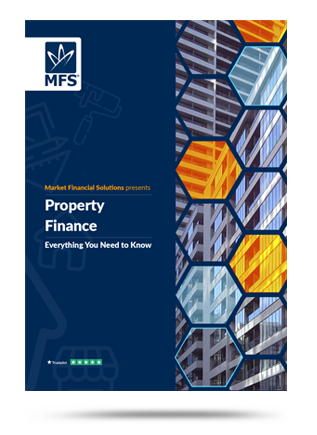
Written by Liza Campion
Head of National Accounts
Market Financial Solutions are a bridging loan and buy-to-let mortgage provider and are not legal, financial, investment or tax advisers. This document is for informational purposes only and does not, and should not be considered, to constitute legal, financial, investment or tax advice or be relied upon by any person to make a legal, financial, investment or tax decision. Therefore, Investors are encouraged to seek appropriate professional advice. The information in this content is correct at time of writing.

The cost-of-living crisis, at times, has felt like it would never end. Daily, we’re bombarded with messages of how everything is expensive. Mortgage bills, food costs, energy tariffs – they’re all on the up.
Many are likely too worried to question when will the cost-of-living crisis end. Some may not even want to know the answer. The “end” is so far away, it may be too painful to bare.
But, property investors may be pleasantly surprised by the state of the economy if they actually dared to look. It may end sooner than expected.
Defining the cost-of-living crisis
Before looking at the question of “when will the cost-of-living crisis end?”, we need to understand what it is we’re focusing on. Generally, the cost-of-living refers to how much money is needed to cover the bare essentials. Obvious examples include food, housing costs, and utilities.
In the UK, and indeed across many countries, these kinds of costs are measured through the consumer price index (CPI). The CPI consists of the prices of a basket of goods and services that are typically purchased by households and the wider population[1]. In the UK, the CPI basket includes, among other things: air fryers, vinyl records, and spray oil[2].
As consumer habits change, items are also removed from the CPI basket. Recently, hand sanitiser was removed, likely in response to Covid-19 challenges dying down.
Where CPI rises, that’s known as inflation – a rising in prices. Deflation occurs where general prices decline. Both have an impact on the economy, but the Bank of England has an official inflation target of 2%[3].
This is where the crisis comes into play. Since mid-2021, inflation has consistently been above that 2% target, peaking at 11.1% in October 2022[4].
What made our recent bout of inflation especially challenging, however, is that often it’s been the essentials that have seen the biggest rises. While overall inflation peaked at 11.1%, increases in food and non-alcoholic drinks were running at a rate of almost 20% in 2023[5].

What has caused the cost-of-living crisis?
To have an idea of when will the cost-of-living crisis end, we need to understand what caused it in the first place. Economics is notoriously complicated, and difficult subject to understand. There are a multitude of factors that go into affecting prices. But, certain events have played a key role in recent years.
Obviously, there was the pandemic. As the economy shut down, drastic actions were taken to keep people afloat. While deemed necessary by many, they have nonetheless proven costly. It’s estimated that our Covid-19 measures cost us between £310bn and £410bn. This equates to about £4,600 to £6,100 per person[6].
The war between Russia and Ukraine also played a role. Europe was largely reliant Russia for oil and gas, and Ukraine for agricultural products[7]. As war emerged, and sanctions were levied, costs skyrocketed.
More recently, there was the mini-Budget. Liz Truss announced plans for unfunded tax cuts in September 2022 which panicked the market, and ended up costing us all billions[8].
Efforts have been made to address all this. Chiefly, the Bank of England has consistently raised interest rates since late 2021 in an effort to tame inflation. In theory, high interest rates encourage consumers to save, not spend. When spending falls, so too should prices, bringing inflation down.
This takes time to take affect however – around two years. This means that as we tried to bring prices down, mortgage, credit card, and other lending costs have risen. There’s no getting away from it, the last few years have been tough.

Better days are here
But, even with all the challenges we’ve faced, better economic days may finally be here. There are signs of recovery, and more are emerging regularly.
Recently, the UK exited a recession, with the fastest GDP growth seen in nearly three years[9]. Some high street banks have been cutting their rates in light of better economic news[10], while it looks like energy prices could start to fall over the coming years[11].
What’s most promising though is that, arguably, our efforts to slow inflation are finally getting results. Inflation is now sitting 2.3%, inches away from target[12]. And, with the next CPI and base rate update mere days away, we could hit our targets within mere days.
So, when will the cost-of-living crisis end? Well, we could be looking at timescales of a few weeks. Fingers crossed; the economic data keeps going in the right direction.
How is the property market faring?
While many are rightfully concerned with the question of when will the cost-of-living crisis end, we should remember that the property market is faring surprisingly well despite it.
House prices stabilised in May, according to Halifax[13]. The typical home now costs £288,688, up on an annual basis by 1.5%. Also, the outlook has proven so promising that Savills revised its five-year forecast recently. It now expects the average house price to rise by £61,500 by the end of 2028[14].
What’s more, mortgage approvals have hit an 18-month high[15], rental yields are sitting at the highest level seen since 2018[16], and auction demand is at record levels[17]. And of course, with an election looming, there could be a wave of activity on the horizon as property investors attempt to take advantage of new policies/leave the market entirely.
In truth, given how multifaceted our cost-of-living crisis is, it may be extremely difficult to pinpoint an exact date for when it ends. Also, while inflation may come under control, it may be some time until consumers start actually noticing that prices are lowering.
Still, we’re on the right path. And regardless of whether costs are rising or plummeting, we at Market Financial Solutions will adapt.
The Complete Guide to
Property Finance
Everything you need to know
- Foundation & different finance types
- Useful tools
- Apply them in real life
- Market insights & more
[1] https://data.oecd.org/price/inflation-cpi.htm#:~:text=A%20consumer%20price%20index%20is,for%20by%20the%20reference%20population.
[2] https://moneyweek.com/economy/inflation/inflation-basket-of-goods
[3] https://www.bankofengland.co.uk/
[4] https://www.ons.gov.uk/economy/inflationandpriceindices/bulletins/consumerpriceinflation/april2024
[5] https://www.bbc.co.uk/news/articles/c0xxwz00nz9o#:~:text=Overall%20inflation%20peaked%20at%2011.1,the%20highest%20since%20the%201970s.
[6] https://commonslibrary.parliament.uk/research-briefings/cbp-9309/#:~:text=Current%20estimates%20of%20the%20total,per%20person%20in%20the%20UK
[7] https://www.bbc.co.uk/newsround/68370090#:~:text=What%20caused%20the%20Cost%20of,to%20power%20transport%20and%20infrastructure
[8] https://www.independent.co.uk/news/uk/politics/truss-mini-budget-house-prices-b2412878.html
[9] https://www.reuters.com/world/uk/uk-economy-grows-by-06-first-quarter-ons-data-shows-2024-05-10/
[10] https://www.bbc.co.uk/news/articles/c3g8geej24ro
[11] https://moneyweek.com/personal-finance/605440/will-energy-prices-go-down
[12] https://www.ons.gov.uk/economy/inflationandpriceindices/bulletins/consumerpriceinflation/april2024
[13] https://www.theguardian.com/money/article/2024/jun/07/uk-house-prices-stabilise-as-rising-wages-and-consumer-confidence-steady-market
[14] https://www.theguardian.com/money/article/2024/may/07/savills-uk-house-prices-rise-this-year-u-turn-forecast
[15] https://www.ft.com/content/d939f4da-d398-4b2a-b53b-3ad7463f3ba1
[16] https://www.property118.com/rental-yields-for-landlords-hit-highest-level-since-2018/
[17] https://www.estateagenttoday.co.uk/features/2024/5/q1-at-auction-the-most-active-auction-market-weve-seen-to-date





